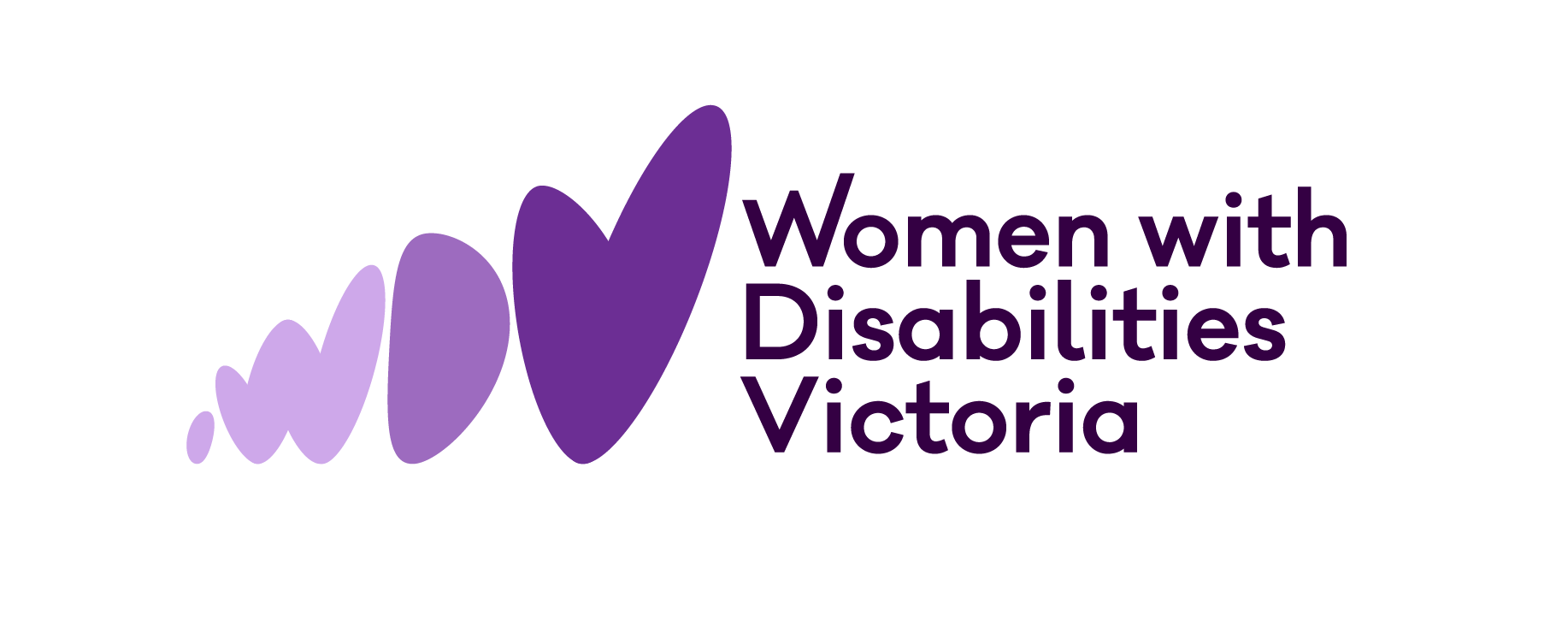16 Days of Activism 2019
In 2019, we ran a social media campaign for ‘16 Days of Activism against Gender-Based Violence’. The campaign focussed on common micro-aggressions and disrespectful behaviour that we experience.
Some of the statements and actions we looked at are not inherently cruel or abusive – some even come from a caring place – however, lack of knowledge about gender and disability can create a culture where people behave disrespectfully. Our campaign shed light on this, and provided information on how to be more respectful about the consent and agency of women with disabilities.
We also made a tip sheet, 12 Principles of Respectful Communication with Women with Disabilities that gives simple guidelines on how we can improve our day to day interactions.
Respect Women: Call it Out
Microaggressions: Experiences by Women with Disabilities
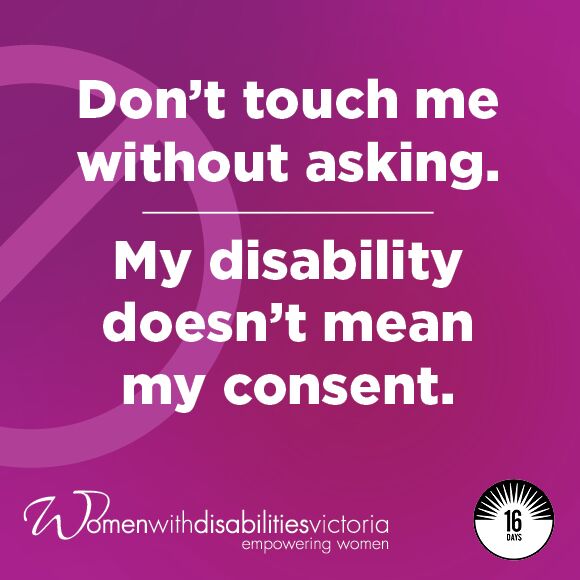
Explanation:
Though it may come from a place of care or concern, a woman’s disability, including a vision or mobility impairment, does not make it okay to touch her without her consent. If you wish to offer someone support, ask first, and be aware that she has the right to refuse.
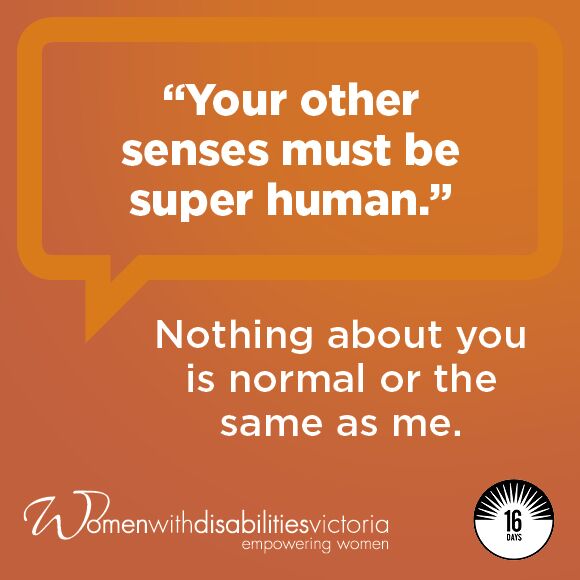
Explanation:
Women with sensory impairments are often told or asked if their other senses are heightened as a result of their disability. This is an invasive question and perpetuates an ‘us and them’ mentality, which sets the woman with disability apart from the person making the comment in yet another way. Do not ask personal questions about a woman’s disability.
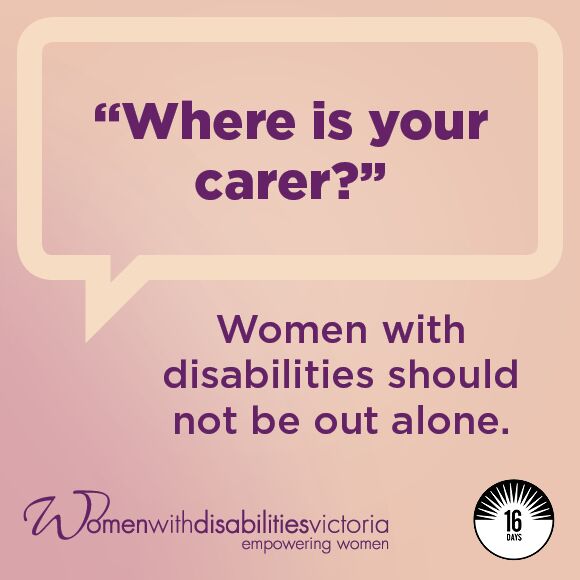
Explanation:
Do not assume that a woman with a disability needs a carer. Women with disabilities are independent and may not need or want a carer, or may only use a carer sometimes. They have a right to be out alone whenever they wish, and their actions do not make them in any way responsible if violence were to occur. Male violence is the fault of men alone.
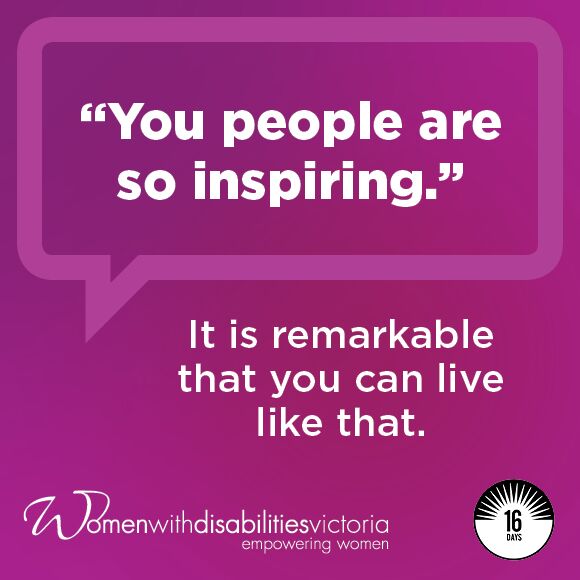
Explanation:
Calling a woman ‘inspiring’ simply for going about their day to day activities suggests that their disability is something that you would find it unthinkable to live with. Women with disabilities don’t exist to provide inspiration or motivation, they are people just like everyone else.
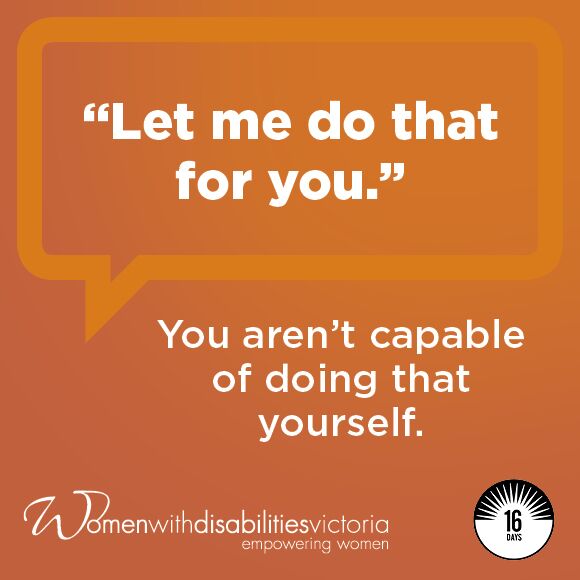
Explanation:
Women with disabilities are incredibly resilient, adaptable and strong. Don’t presume that someone needs your help unless you are explicitly asked. Performing tasks for a woman with disability takes away her agency, and is a controlling and aggressive behaviour.
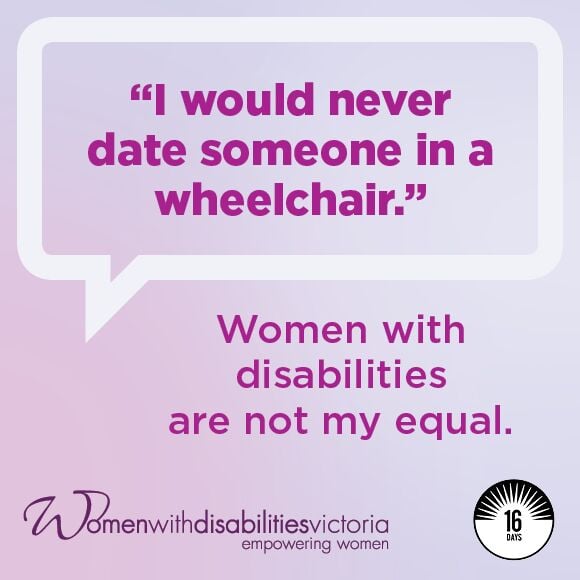
Explanation:
Suggesting that you wouldn’t enter into a relationship with a woman based on her disability alone constitutes ableism, and contributes to a culture where violence against people with disabilities is prolific. Sexist attitudes that perpetuate the idea that a man can have his ‘choice’ of women compounds the impact of this for women with disabilities.
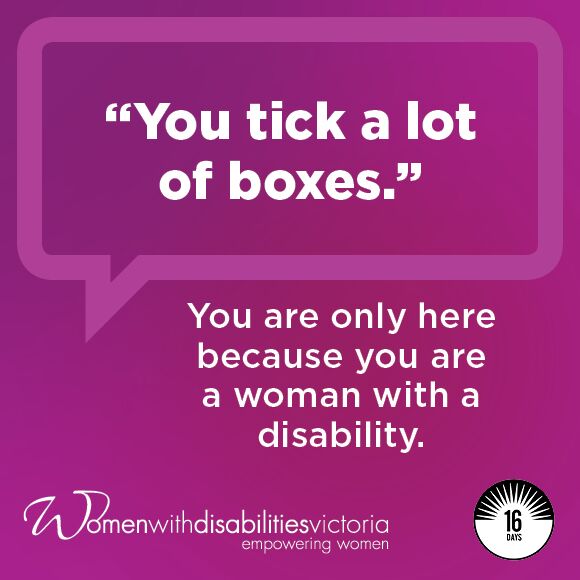
Explanation:
Women with disabilities have a depth of knowledge and experience, both in the area of disability but in all other fields, professions and skillsets. Suggesting that a woman with disability was only hired for being ‘diverse’ disregards these skills and abilities, and takes away her credibility as a contributing member of an organisation.
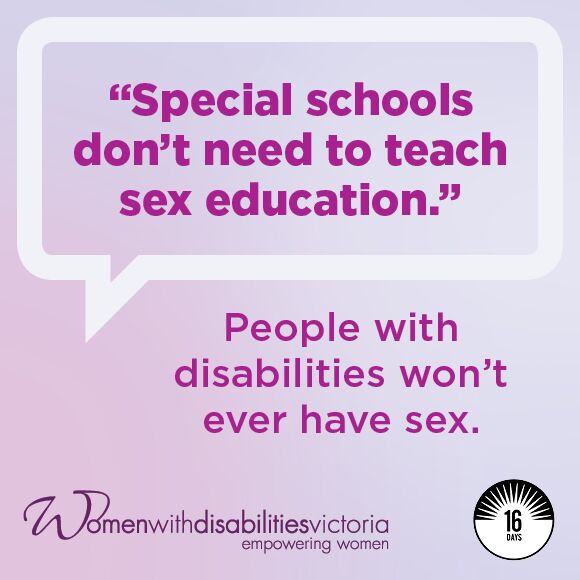
Explanation:
Women with disabilities are sexual beings as much as able-bodied people. Depriving young people with disabilities access to sex and respectful relationships education means that as adults, they may not have the tools to navigate sex and relationships in a safe way. This is especially dangerous considering the high rates of sexual and intimate partner violence perpetrated against women with disabilities.
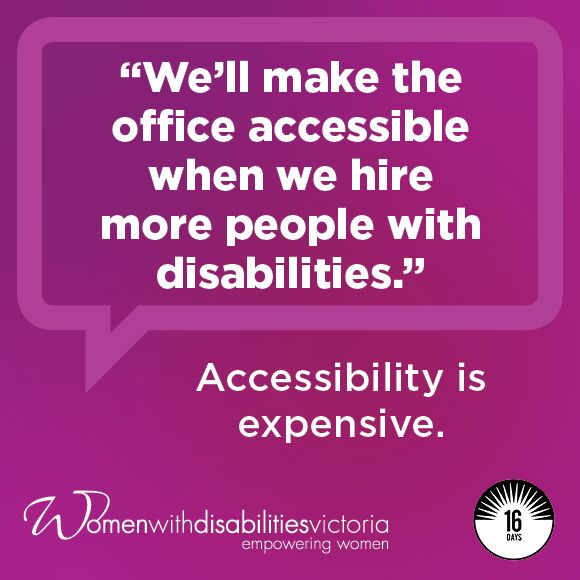
Explanation:
Making a space accessible for people with disabilities should be a consideration whether or not there are people with disabilities working there at that particular time. If spaces aren’t accessible this creates an additional barrier to recruitment of people with disabilities, and put the burden on the new employee to make changes happen around them.
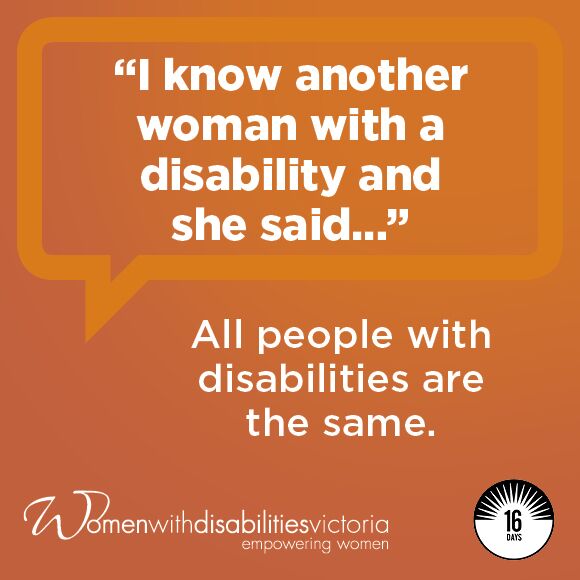
Explanation:
Women with disabilities are as diverse as any other group of people, spanning different ages, backgrounds, religions and sexual identities, as well as extremely varied experiences of disability. Don’t assume that one woman with a disability can speak for all others.
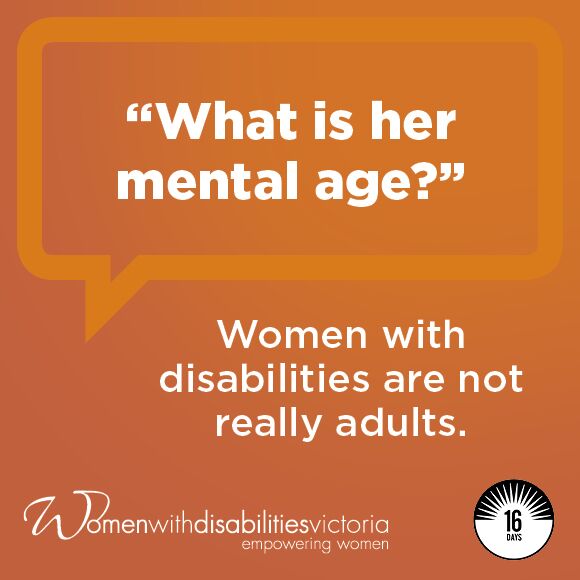
Explanation:
The infantalisation of women with disabilities and the concept of a ‘mental age’ suggests that women with cognitive or intellectual disabilities are not really adults. This is incredibly marginalising and contributes to a culture where violence and control is accepted because women ‘don’t understand’, or don’t have the ability to make decisions about their own life.
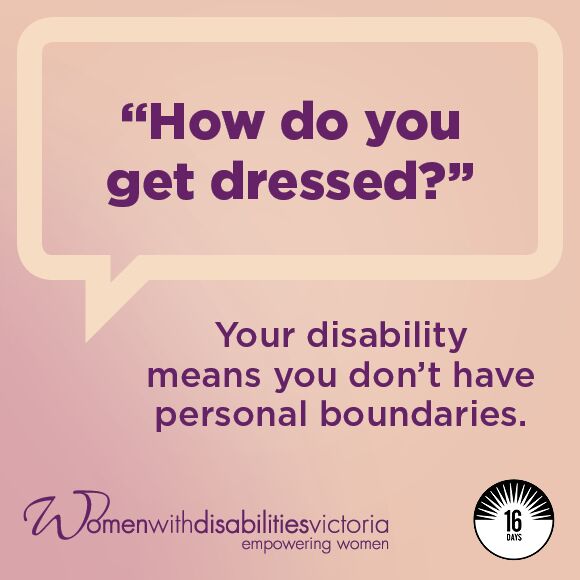
Explanation:
Women with disabilities have a right to privacy as much as women and men without disabilities. These kinds of questions are invasive and personal; you wouldn’t ask them of anyone else so don’t assume it is okay to ask them of a woman with disability.
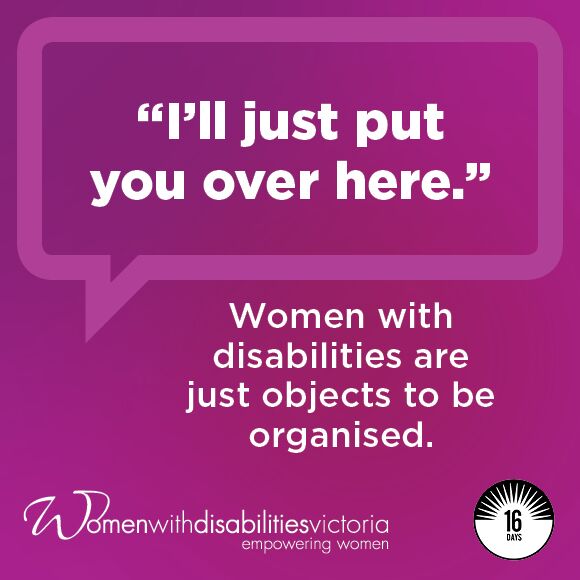
Explanation:
Language that dehumanises or objectifies women with disabilities contributes to a culture that condones violence against people with disabilities, especially in institutional or care settings. Women with disabilities are individuals with rights, wants and agency, not just the job you do for a salary.
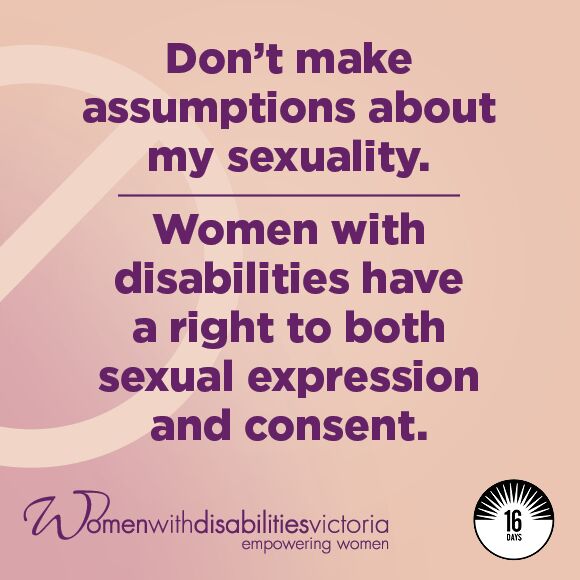
Explanation:
As for people without disabilities, women with disabilities have varied sexual preferences and identities. When women with disabilities are desexualised their agency is limited, and poor sexual education for young people with disabilities makes them more vulnerable to controlling or abusive behaviours within a relationship. When women with disabilities are sexually objectified, their consent is taken away from them and they are put at risk of experiencing sexual violence.
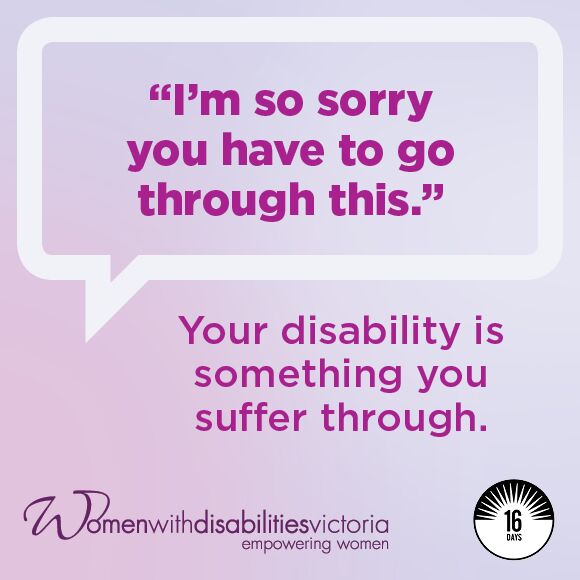
Explanation:
Many people with disabilities do not consider their conditions to be debilitating. Women with disabilities often take pride in their diversity, as highlighted by the neuro-diversity pride movement, and the cultural strength of the deaf community. By suggesting they are suffering you are diminishing their experience and disregarding the joy they have in their lives.
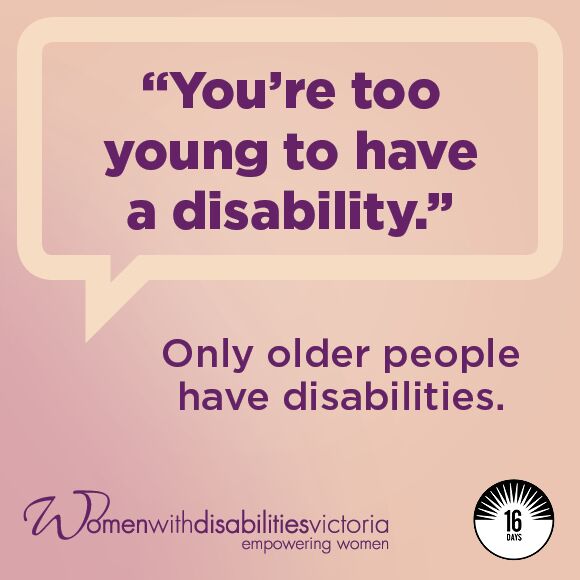
Explanation:
People can be born with a disability or acquire a disability at any time in their life. Comments such as this one not only invalidate the woman with a disability’s own experience, they perpetuate societal views about disability that mean there are less and poorer support services for young women with disabilities.
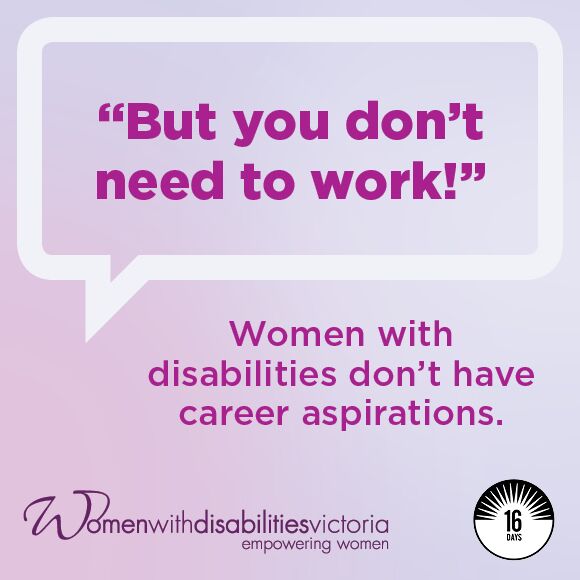
Explanation:
Women with disabilities have career aspirations and professional goals the same as people without disabilities. They deserve to gain satisfaction from their professional accomplishments as much as anyone else. Don’t assume that because they have a disability, they don’t have the same motivations or goals as people without disabilities.
